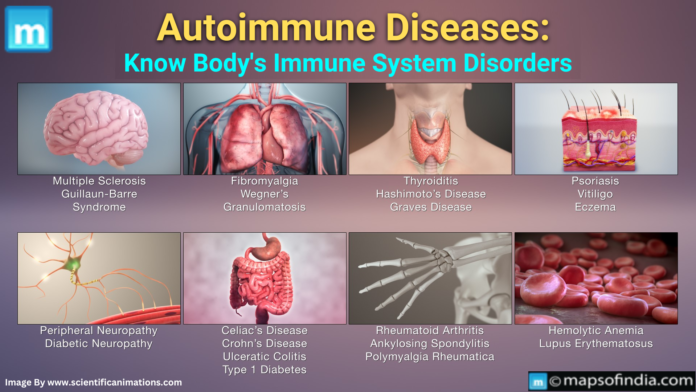In autoimmune diseases, there is a breakdown in communication within the body’s defence forces.r The immune system’s job is to defend the body against foreign invades. However, in autoimmune conditions, the immune cells lose their ability to distinguish self from non-self. As a result, they mistakenly launch attacks on the body’s healthy tissues and organs rather than just protecting the body from outside threats. The immune system ends up causing harm by targeting and damaging the individual’s healthy cells and cellular components.
Below is the list of diseases and their diagnosis and treatment:
-
Rheumatoid Arthritis
This disease primarily impacts the joints, resulting in pain, inflammation, and rigidity. It feels as though your joints have become corroded and stiff, similar to rusty hinges, making basic movements quite uncomfortable and challenging.
-
Lupus
Lupus is a deceptive condition that resembles a chameleon in how it can impact multiple body areas. It can involve the skin, joints, kidneys, and brain. Individuals with lupus may constantly feel fatigued, experience joint discomfort, develop skin rashes, and, in some cases, face kidney complications. Due to its varied presentation between patients, lupus is challenging to diagnose as it can manifest in different ways across individuals.
-
Type 1 Diabetes
In this disorder, the immune system mistakenly assaults the pancreatic cells responsible for producing insulin, a hormone that helps regulate blood glucose levels. When there is insufficient insulin production, the body cannot appropriately process sugar from food intake, resulting in elevated blood sugar concentrations. This leads to various symptoms, such as increased thirst, frequent urination, and unintended weight loss as the body attempts to rid itself of excess glucose through urine. The lack of proper insulin control over blood sugar levels is the hallmark of this condition.
-
Multiple Sclerosis
Multiple sclerosis, including the brain and spinal cord, impacts the central nervous system. It creates issues akin to having faulty wiring in the body’s network for internal communication. Symptoms can differ significantly from person to person but may involve:
- Fatigue.
- Weak muscles.
- Challenges with walking or mobility.
- Problems with coordination and balance.
-
Celiac Disease
This autoimmune disorder impacts the digestive system, especially in reaction to gluten, wheat, barley, and rye protein. For individuals with celiac disease, consuming gluten prompts their immune system to assault the inner lining of the small intestine, resulting in side effects such as abdominal discomfort, diarrhoea, and nutritional deficiencies.
Determining autoimmune diseases can be challenging, given that their signs and symptoms may resemble those of other ailments and that they tend to impact various areas of the body. Physicians employ a mix of medical history, physical examinations, bloodwork, and imaging tests to arrive at an accurate diagnosis.
The goal of treatment for autoimmune diseases is to quell the overactive immune response and manage symptoms. This may involve taking medications to decrease inflammation and pain and drugs that dampen immune system activity. Sometimes, lifestyle modifications such as adopting a nutritious diet, practicing routine exercise, and handling stress appropriately can provide additional benefits. The treatment aims to calm the immune system’s hyperactivity and control the symptoms.
While having an autoimmune disease can present difficulties, it is possible to keep symptoms under control and have a life entirely of meaning with the appropriate treatment and support system. Individuals with autoimmune diseases must collaborate closely with their healthcare providers to develop the most suitable treatment regimen based on their unique needs. With diligent medical care and self-care practices, many people living with autoimmune diseases are capable of living well despite their condition.




